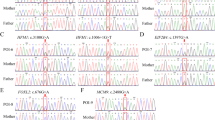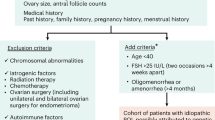Abstract
Purpose
Premature ovarian insufficiency (POI) affects approximately 1% of women before the age of 40. Genetic contribution is a significant component of POI. The NOBOX gene was considered one of the major genetic causes of POI. However, the pathogenicity and the penetrance of NOBOX variants remain unclear.
Methods
We studied the whole coding region of the NOBOX gene by next generation sequencing in a cohort of 810 patients with POI, and we compared the frequency of each identified NOBOX variant to the general population taking into account the ethnicity of each individual.
Results
Screening of the whole coding region of the NOBOX gene allowed us to identify 35 different variants, including 5 loss-of-function variants. In total, 171 patients with POI (25%) carried out at least one NOBOX variant. Regarding missense variants, we observed a significant overrepresentation of the most frequent ones in our 810 POI patients as compared to the general, except for p.(Arg117Trp). However, taking into account the ethnic origin of the individuals, we observed no significant OR difference for p.(Arg44Leu) and p.(Arg117Trp) in African subgroup and for p.(Asp452Asn) in European subgroup.
Conclusion
This population study suggests that the p.(Arg44Leu) variant could be considered benign variant and that the p.(Asp452Asn) and p.(Arg117Trp) variants could be considered moderate risk pathogenic variants with probably partial and very low penetrance and/or expressivity. In contrast, p.(Gly91Trp) and p.(Gly152Arg) variants could be considered pathogenic variants with a moderate functional impact.




Similar content being viewed by others
Data availability
The data that support the findings of the study are available from the corresponding author and the first author upon reasonable request.
References
Christin-Maitre S, Givony M, Albarel F, Bachelot A, Bidet M, Blanc JV, Bouvattier C, Brac de la Perrière A, Catteau-Jonard S, Chevalier N, Carel JC, Coutant R, Donadille B, Duranteau L, El-Khattabi L, Hugon-Rodin J, Houang M, Grynberg M, Kerlan V, Leger J, Misrahi M, Pienkowski C, Plu-Bureau G, Polak M, Reynaud R, Siffroi JP, Sonigo C, Touraine P, Zenaty D. Position statement on the diagnosis and management of premature/primary ovarian insufficiency (except Turner Syndrome). Ann Endocrinol (Paris). 2021;82(6):555–71. https://doi.org/10.1016/j.ando.2021.09.001.
Bouilly J, Bachelot A, Broutin I, Touraine P, Binart N. Novel NOBOX loss-of- function mutations account for 6.2% of cases in a large primary ovarian insufficiency cohort. Hum Mutat. 2011;32(10):1108–13. https://doi.org/10.1002/humu.21543.
Jiao X, Ke H, Qin Y, Chen ZJ. Molecular genetics of premature ovarian insufficiency. Trends Endocrinol Metab. 2018;29(11):795–807. https://doi.org/10.1016/j.tem.2018.07.002.
Rajkovic A, Pangas SA, Ballow D, Suzumori N, Matzuk MM. NOBOX deficiency disrupts early folliculogenesis and oocyte-specific gene expression. Science. 2004;305(5687):1157–9. https://doi.org/10.1126/science.1099755.
Lechowska A, Bilinski S, Choi Y, Shin Y, Kloc M, Rajkovic A. Premature ovarian failure in nobox-deficient mice is caused by defects in somatic cell invasion and germ cell cyst breakdown. J Assist Reprod Genet. 2011;28(7):583–9. https://doi.org/10.1007/s10815-011-9553-5.
Venturella R, De Vivo V, Carlea A, D’Alessandro P, Saccone G, Arduino B, Improda FP, Lico D, Rania E, De Marco C, Viglietto G, Zullo F. The genetics of non-syndromic primary ovarian insufficiency: a systematic review. Int J Fertil Steril. 2019;13(3):161–8. https://doi.org/10.22074/ijfs.2019.5599.
Patton BK, Madadi S, Briley SM, Ahmed AA, Pangas SA. Sumoylation regulates functional properties of the oocyte transcription factors SOHLH1 and NOBOX. FASEB J. 2023;37(2):e22747. https://doi.org/10.1096/fj.202201481R.
França MM, Funari MFA, Lerario AM, Nishi MY, Pita CC, Fontenele EGP, Mendonca BB. A novel homozygous 1-bp deletion in the NOBOX gene in two Brazilian sisters with primary ovarian failure. Endocrine. 2017;58(3):442–7. https://doi.org/10.1007/s12020-017-1459-2.
Li L, Wang B, Zhang W, Chen B, Luo M, Wang J, Wang X, Cao Y, Kee K. A homozygous NOBOX truncating variant causes defective transcriptional activation and leads to primary ovarian insufficiency. Hum Reprod. 2017;32(1):248–55. https://doi.org/10.1093/humrep/dew271.
Bouali N, Francou B, Bouligand J, Lakhal B, Malek I, Kammoun M, Warszawski J, Mougou S, Saad A, Guiochon-Mantel A. NOBOX is a strong autosomal candidate gene in Tunisian patients with primary ovarian insufficiency. Clin Genet. 2016;89(5):608–13. https://doi.org/10.1111/cge.12750.
Eskenazi S, Bachelot A, Hugon-Rodin J, Plu-Bureau G, Gompel A, Catteau-Jonard S, Molina-Gomes D, Dewailly D, Dodé C, Christin-Maitre S, Touraine P. Next generation sequencing should be proposed to every woman with “idiopathic” primary ovarian insufficiency. J Endocr Soc. 2021;5(7):bvab032. https://doi.org/10.1210/jendso/bvab032.
Qin Y, Choi Y, Zhao H, Simpson JL, Chen ZJ, Rajkovic A. NOBOX homeobox mutation causes premature ovarian failure. Am J Hum Genet. 2007;81(3):576–81. https://doi.org/10.1086/519496.
Bouilly J, Roucher-Boulez F, Gompel A, Bry-Gauillard H, Azibi K, Beldjord C, Dodé C, Bouligand J, Mantel AG, Hécart AC, Delemer B, Young J, Binart N. New NOBOX mutations identified in a large cohort of women with primary ovarian insufficiency decrease KIT-L expression. J Clin Endocrinol Metab. 2015;100(3):994–1001. https://doi.org/10.1210/jc.2014-2761.
Luo W, Ke H, Tang S, Jiao X, Li Z, Zhao S, Zhang F, Guo T, Qin Y. Next-generation sequencing of 500 POI patients identified novel responsible monogenic and oligogenic variants. J Ovarian Res. 2023;16(1):39.
Ferrari I, Bouilly J, Beau I, Guizzardi F, Ferlin A, Pollazzon M, Salerno M, Binart N, Persani L, Rossetti R. Impaired protein stability and nuclear localization of NOBOX variants associated with premature ovarian insufficiency. Hum Mol Genet. 2016;25(23):5223–33. https://doi.org/10.1093/hmg/ddw342.
França MM, Funari MFA, Lerario AM, Santos MG, Nishi MY, Domenice S, Moraes DR, Costalonga EF, Maciel GAR, Maciel-Guerra AT, Guerra-Junior G, Mendonca BB. Screening of targeted panel genes in Brazilian patients with primary ovarian insufficiency. PLoS One. 2020;15(10):e0240795. https://doi.org/10.1371/journal.pone.0240795.
Luborsky JL, Meyer P, Sowers MF, Gold EB, Santoro N. Premature menopause in a multi-ethnic population study of the menopause transition. Hum Reprod. 2003;18(1):199–206. https://doi.org/10.1093/humrep/deg005.
Fan S, Jiao Y, Khan R, Jiang X, Javed AR, Ali A, Zhang H, Zhou J, Naeem M, Murtaza G, Li Y, Yang G, Zaman Q, Zubair M, Guan H, Zhang X, Ma H, Jiang H, Ali H, Dil S, Shah W, Ahmad N, Zhang Y, Shi Q. Homozygous mutations in C14orf39/SIX6OS1 cause non-obstructive azoospermia and premature ovarian insufficiency in humans. Am J Hum Genet. 2021;108(2):324–36. https://doi.org/10.1016/j.ajhg.2021.01.010. (Erratum in: Am J Hum Genet. 2022 Jul 7;109(7):1343).
Ke H, Tang S, Guo T, Hou D, Jiao X, Li S, Luo W, Xu B, Zhao S, Li G, Zhang X, Xu S, Wang L, Wu Y, Wang J, Zhang F, Qin Y, Jin L, Chen ZJ. Landscape of pathogenic mutations in premature ovarian insufficiency. Nat Med. 2023;29(2):483–92. https://doi.org/10.1038/s41591-022-02194-3.
Author information
Authors and Affiliations
Contributions
LEK and TB co-conceptualized and designed the study. SP, PJ, DMG, EP, SJC, PT, SCM, and GPB reviewed medical records and collected patient data. CF performed molecular analysis and provided data analysis, tables, and figures. PJ, TB, CV, JMD, and LEK have written content toward the first draft of the manuscript. All authors reviewed and revised the manuscript and approved the final version as submitted and agree to be accountable for all aspects of the work. All authors are responsible for the accuracy and integrity of the work.
Corresponding author
Ethics declarations
Conflict of interest
The authors declare no competing interests.
Additional information
Publisher's Note
Springer Nature remains neutral with regard to jurisdictional claims in published maps and institutional affiliations.
Supplementary Information
Below is the link to the electronic supplementary material.
Rights and permissions
Springer Nature or its licensor (e.g. a society or other partner) holds exclusive rights to this article under a publishing agreement with the author(s) or other rightsholder(s); author self-archiving of the accepted manuscript version of this article is solely governed by the terms of such publishing agreement and applicable law.
About this article
Cite this article
Jordan, P., Verebi, C., Perol, S. et al. NOBOX gene variants in premature ovarian insufficiency: ethnicity-dependent insights. J Assist Reprod Genet 41, 135–146 (2024). https://doi.org/10.1007/s10815-023-02981-y
Received:
Accepted:
Published:
Issue Date:
DOI: https://doi.org/10.1007/s10815-023-02981-y




